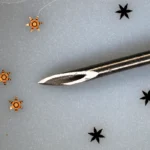Cui Awarded Faculty Scholar Award for new HIV treatment study

INBT core researcher Honggang Cui was one of 12 recipients across Johns Hopkins University recently recognized by the Johns Hopkins Center for AIDS Research with a Faculty Scholar Award for his proposal for development of a slow-release viral suppressant injectable for HIV-infected patients.
The $50k award helps early-career investigators get research in new areas off the ground, with the goal of generating pilot data that can then be used to appeal for larger and longer-term funding opportunities. As a tenured professor in the Department of Chemical and Biomolecular Engineering and long-time investigator, Cui is not new to the research game; however, this is his first venture into AIDS work.
The HIV lifecycle has been studied heavily since the 1980s and while much has been learned and anti-viral suppressant treatments have been developed, there is still no cure for the disease. Treatments involve a once-daily pill taken orally by HIV-infected patients: a regimen that some patients find difficult to remember. Cui says patient compliance is especially challenging for patients in developing countries or underserved communities. In these places, lack of amenities like running water, restrooms, proper storage, and other challenges makes difficult for patients maintaining daily hygiene and medication routines, he says.
“We have therapeutics; now we have to figure out how to improve patient compliance,” says Cui. “if we can increase the intervals between treatments, people do not have to compromise too much of their lives to comply and stay healthy.”
The project will involve developing a long-term injectable hydrogel from the anti-viral agents already in existence. By converting anti-viral agent into self-assembling conjugates known as a hydrogelator and designing the resulting molecules to disperse in water, a nanofiber hydrogel is formed. This hydrogel will then be injected subcutaneously, staying around the injection site, rather than dispersing throughout the body, and allowing the anti-viral agent to slowly disperse from the hydrogel and into the bloodstream. Eventually, the hydrogel will break down completely and the patient will need another injection for their body to continue suppressing HIV cells in their body from becoming viral and spreading, Cui says. At this point, he and his co-collaborators aren’t sure how long a patient might be able to go between injections, but it will certainly be longer than the current daily medications patients must rely on to stay healthy.
The Faculty Scholar Award will help the interdisciplinary research team, which includes Charles Flexner, a professor in the School of Medicine who treats HIV-infected patients, to determine if gels are viral compatible and can serve as a long-acting therapeutics. If the researchers can prove these two things, they hope to securing suppport to continue developing this treatment. Cui says he hopes this pilot research can lead to something that not only helps people around the world, but also showcases how Johns Hopkins is creating a culture of interdisciplinary collaboration.
“This project is just another example of how Hopkins is leading the way by bringing together minds from across disciplines to solve problems and move forward in research together,” said Cui.
By Amy Weldon
Latest Posts
-
 Johns Hopkins Postdoc Named in Forbes `30 Under 30′ List
December 8, 2025
Johns Hopkins Postdoc Named in Forbes `30 Under 30′ List
December 8, 2025
-
 Micro Grippers: David Gracias Builds Micromachines That Fold, Stick, Swim, and Sense—All Inside the Human Body.
November 20, 2025
Micro Grippers: David Gracias Builds Micromachines That Fold, Stick, Swim, and Sense—All Inside the Human Body.
November 20, 2025
-
 A bold new approach to autoimmune diseases
November 19, 2025
A bold new approach to autoimmune diseases
November 19, 2025


